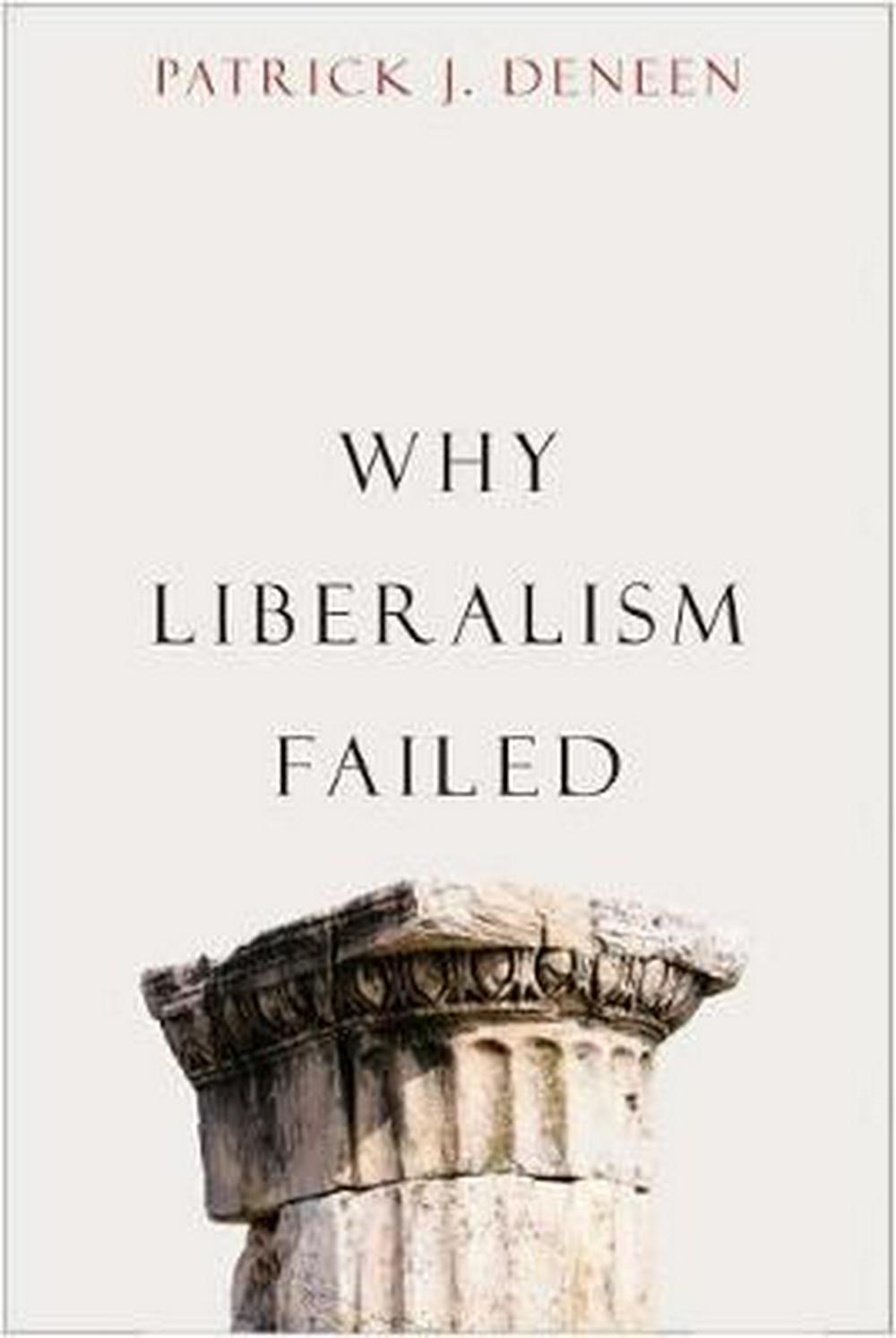A liberal believes in liberty, right? Well, of course. It’s there in the name. But what if the liberal quest to expand our liberty is actually eroding our liberties? That’s the argument Patrick J. Deneen—associate professor of political science at the University of Notre Dame—makes in Why Liberalism Failed, a persuasive contribution to the ongoing political debate in North America.
How and why is liberalism failing? Primarily because liberalism, as a centuries-old political philosophy, is rooted in a defective understanding of the human person. Liberalism ignores the person’s rootedness in local communities and their myriad customs and influences, replacing that rootedness with an inordinate allegiance to state and market, the instruments of our supposed liberation.
As Deneen sees it, the United States as a whole was established on liberal principles, and these have developed over the past nearly two and a half centuries in ways consistent with liberalism’s underlying presuppositions but inconsistent with a healthy social fabric. However, the overwhelming dominance of liberalism has been masked by the recent superficial polarization of the national political landscape into two factions.
Indeed, our most vociferous conflicts have pitted classical liberals, with their affection for a free market and small government, against progressive liberals, who view government as an instrument for the expansion of individual autonomy. Our immersion in this intramural debate disguises the reality that we’ve already settled the question of regime. Despite our supposed differences, we agree that liberalism is the optimal political arrangement for humanity. Our principal disagreements are thus over means and not ends.
In what way then has liberalism failed? If we’re all so apparently supportive of its goals, why does Deneen judge that it has failed to deliver on its promises? Because its failures are directly related to its successes—because of liberalism’s emphasis on the autonomous individual caught between state and market, it minimizes and even subverts institutions and associations that are irreducible to the wills of state and individual.
Liberalism’s failures are directly related to its successes.
Liberalism heralds individual liberties but, ironically, effectively facilitates disempowerment, fragmentation, and resentment. As the state expands—in order to protect and advance individual liberty—its depersonalized bureaucracy and globalized market become increasingly powerful forces to which isolated individuals must submit.
Today’s populist and nationalist movements suggest that liberalism is failing in certain significant respects—not because it has betrayed its own principles, but because it is being true to itself and is now experiencing the contradictions and absurdities inherent in its inner logic.
Liberalism’s Failure
Deneen divides his argument into seven chapters and a conclusion. In “Unsustainable Liberalism,” he admits that “[n]o other political philosophy had proven in practice that it could fuel prosperity, provide relative political stability, and foster individual liberty with such regularity and predictability” (21). This has been a significant part of liberalism’s appeal in a world plagued by poverty and tyranny. It is true, as well, that liberalism has drawn on a pre-liberal inheritance that has kept it going but that it is incapable of renewing. Because liberalism’s individualism has been nurtured by resources rooted in communal traditions, and because individualism does little if anything to foster community, it’s living off a constantly depleting store of social and cultural capital.

Why Liberalism Failed
Patrick Deneen
Patrick Deneen argues in this provocative book that liberalism is built on a foundation of contradictions: it trumpets equal rights while fostering incomparable material inequality; its legitimacy rests on consent, yet it discourages civic commitments in favor of privatism; and in its pursuit of individual autonomy, it has given rise to the most far-reaching, comprehensive state system in human history. Deneen warns that the centripetal forces now at work on our political culture are not superficial flaws but inherent features of a system whose success is generating its own failure.
In “Uniting Individualism and Statism,” Deneen argues that, while classical and progressive liberals are busy wrangling over individual autonomy and expansive government, we fail to recognize that these two realities exist in a mutually reinforcing relationship. Because of liberalism’s emphasis on the autonomous individual suspended beneath the state, it minimizes and even subverts society’s other associations and institutions. Once individuals are liberated from cultural norms and social ties, they no longer have reliable networks and associations to support them. Thus, the state is the institution to which they must look.
Then we come to “Liberalism as Anti-Culture,” in which Deneen observes that both classical and progressive liberals wish to undermine culture’s normative and formative role in society. They want to undermine local cultures and their attendant social norms, replacing them with a pervasive anti-culture. Local cultures remain in bits and pieces, held together by ideological consumerism. The subversion of these localized associations and norms deemed obstacles to individual autonomy ironically make the individual submissive to a heavy apparatus of abstract, depersonalized federal law.
Those addressing the relationship between liberalism and our current predicament can hardly ignore the influence of technology, and Deneen is no exception. While many observers rail against technology, assuming that we’re somehow slaves to its imperatives, in “Technology and the Loss of Liberty” Deneen understands that we shape technology in accordance with our own central convictions. Moreover—and this is where Deneen is likely to court controversy—he believes that even the American republic that the founders fashioned in the 1780s is a powerful technology designed to liberate us from the need to be virtuous and encourages us to become self-seeking individuals at the mercy of our own desires. The Constitution joined with modern technologies to undermine community and to subvert our capacity for self-governance.
Much as past political philosophers, beginning with Plato and Aristotle, have focused on education as a crucial element in the life of the polis, Deneen tackles the plight of the universities in “Liberalism against the Liberal Arts.” In its crusade against cultural norms, liberalism has overturned the very educational tradition—the liberal arts—that fostered its ascendance. It overturns the liberal arts by minimizing the civilizational norms and traditions that the liberal arts once studied, and in their place it fosters a pseudo-multiculturalism that effectively homogenizes education. Liberalism transforms the humanities, causing students to focus on identity, oppression, and grievance. But more than anything else, it minimizes the significance of the humanities, signaling to students that the only truly legitimate areas of study are economics, business, and the STEM (science, technology, engineering, mathematics) disciplines.
In “The New Aristocracy” Deneen points out that, while liberalism opposed the old landed nobility and their privileges, it has replaced the former arrangement with a merit-based order whose elite would have the right talents for negotiating a new world without the old cultural norms, communal obligations, and natural restraints. The liberal world order is defined by winners and losers. The losers tend to be poorly educated people living in rural areas, while the winners tend to be highly educated and comparatively wealthy people living in the cities and suburbs. The new aristocracy easily perpetuates itself, because the elite have a significant advantage in giving their children the resources necessary to stay in the upper echelons of society. It’s a lonely world in which individuals have been detached from the social networks and communities that previously would have shaped and supported them.
Next we come to “The Degradation of Citizenship,” in which Deneen argues that, by attempting to curtail the powers of local factions, the Constitution effectively diverted citizens’ attentions from “the nearness and immediacy of the township” (176), where they could have a more effective impact, to a national arena where their energies would be dissipated, enabling rule by elites. In other words, liberalism has turned democracy into anti-democracy.
Liberalism has turned democracy into anti-democracy.
Finally, in Deneen’s concluding chapter, “Liberalism after Liberalism,” he suggests that the way to recover from the deformations of liberalism is to reclaim what is smaller, more limited, and parochial—“practices fostered in local settings, focused on the creation of new and viable cultures, economics grounded in virtuosity within households, and the creation of civic polis life” (197). Deneen makes the startling suggestion that the spectacle of presidential electoral politics has assumed the contours of a nationally televised sporting event, distracting a largely passive population from active involvement in civic life at the local level. If Deneen is right, then perhaps we should not be surprised if election campaigns pit narcissistic personalities against each other with entertainers emerging victorious.
While Deneen’s argument has any number of facets worth exploring, we will focus on three areas: (1) elite rule, (2) education, and (3) the relationship between theory and practice.
(1) Elite Rule
There is nothing intrinsically wrong with elite rule, if by this we simply mean that, in the normal course of living, leaders tend to emerge out of their communities. There are myriad books, courses, and workshops devoted to developing leaders and to nurturing leadership qualities in young people. But liberalism encourages individuals to seek leadership based on the assumption of their own superiority to those they undertake to lead.
This self-promotion is based on the belief in their greater enlightenment, of their progressive credentials, and their willingness to break with the constraints of the past, despite their communities’ continued allegiance to their own more parochial traditions. Those remaining loyal to their immediate communal ties must apparently be broken of these so as to increase their awareness of their common humanity and, more to the point, of the universality of desire. Because communal norms limit these desires, liberals—whether market- or state-oriented—believe it’s their responsibility to emancipate ordinary people from such norms for their own good.
Of course, whenever anyone mounts a defense of local tradition, the more skeptical are likely to raise the specter of racial segregation or anti-Semitism—traditions that might be said to have grown organically out of the dynamics of a plural society in which a majority maintained hegemony, sometimes through overt violence, over minorities. This is something that Deneen might’ve acknowledged and grappled with in this book. While anti-Semitism eventually faded from American life through the work of such organizations as B’nai B’rith International, the end of racial segregation required the active intervention of Washington, including the Supreme Court’s Brown vs. the Board of Education (1954) decision, and the three major civil rights acts of the mid-1960s.
If the tradition of racial and religious discrimination required elite action to end obvious evils, then doesn’t that make all traditions potentially suspect? Shouldn’t the more enlightened among us attempt to redirect our proximate loyalties elsewhere? This argument resonates with many, especially visible minorities feeling vulnerable in the face of local majorities. In other words, liberals are picking up on genuine fears and concerns.
Yet, as Deneen correctly recognizes, liberal efforts to pull people away from their particular customs and mores are in effect fueling an expansion of the state apparatus. Whereas informal socially enforced rules once regulated interpersonal relations, liberalism has sought a standardization of practices through the imposition of formal laws enacted by the state. The net effect is to fragment the very communities that have nurtured the liberal project. Once more liberal success leads to liberal failure.
(2) Education
As for education, Deneen isn’t alone in his advocacy of nurturing and maintaining the liberal arts in the face of contemporary moves to remake the university as a purveyor of technical training. Even in Christian universities it’s often difficult to persuade administrators of the merits of having students grapple with Plato’s Republic or Augustine’s City of God, whose cash value is not immediately obvious. This response suggests that Christians who believe in the importance of a solid education in the arts and humanities must justify their commitments without giving in to a misguided academic nostalgia. Indeed we shouldn’t seek to make of our students Platonists or Aristotelians or to assume that the so-called canon of Great Books speaks with one voice that will remedy our educational and cultural malaise. Deneen himself recognizes that many of these texts disseminate ideas that have actually undermined the educational enterprise.
Yet reading the Great Books helps students in at least four ways. First, it enables them to grapple with the big questions that philosophers and theologians have been debating for centuries. For example: What is authority, and what makes it legitimate? What is justice? What makes for a happy life? Who is God? What does he expect of us?
Second, it enables students to know themselves and their communities by acquainting them with the basic writings that have shaped the culture and predisposed people to seek certain types of answers to the perennial questions. For example: A reading of Jefferson’s Declaration of Independence is immeasurably enhanced by a reading of John Locke’s Second Treatise on Civil Government and even Thomas Hobbes’s Leviathan.
Third, it enables students, especially Christian ones, to recognize the foundational religious presuppositions underpinning these writings. For example: Where does Platonism locate “evil,” and where does it look for salvation? How does Platonism’s narrative differ from the Bible’s, and how does it affect the way Plato answers certain perennial questions?
Finally, it teaches a student to think, communicate, imagine, and adapt to new environments and ideas.
Those immersed in the humanities will have a breadth of vision lacking in those with mere technical knowledge of a single field.
Do the liberal arts liberate, as the classicists might tell us? Only in the sense that they free us from the confines of our own era, expanding our horizons beyond what we see on television and Facebook, and allow us to take some distance from the ephemeral standards of popular culture. A proper education, as Deneen rightly stresses, will help us to recover a better understanding of liberty as “self-rule and disciplined self-command” rather than the current notion of liberty as “the absence of restraints upon one’s desire” (116).
Indeed, those immersed in the humanities will have a breadth of vision lacking in those with mere technical knowledge of a single field. This breadth will enable them to aspire to something approaching genuine wisdom rather than mere command of many facts and techniques.
(3) Theory and Practice
Throughout this book Deneen expresses a preference for lived experience in community over the articulation of theories. In the face of grand theoretical abstractions, he refrains from articulating a counter-theory to vanquish liberal efforts to make reality conform to theory. Deneen argues that “[t]he search for a comprehensive theory is what gave rise to liberalism and successor ideologies in the first place” (196). But what if the problem is not with theories as such but with theories that are impervious to reality?
There is a huge difference between ideological efforts to impose a utopian fantasy on flesh-and-blood persons and their communities and a public philosophy that recognizes both human potential and human frailty, along with the need for vibrant local communities. Indeed, doing justice in the political realm requires deep theoretical thought about the relationship between God and his world, between individuals and their communities, and between theory and practice.
Are there elements of the liberal project worth celebrating? Deneen might’ve emphasized the way certain liberal emphases—for example, freedom of religion, association, assembly and speech—might yet play positive roles in renewing and redirecting our society, culture, and political arrangements. This suggests that even the distortions of political ideologies are built on a genuine good worth seeking as a proximate rather than an ultimate good.
Liberalism isn’t wrong to defend the liberties of individuals, which we properly esteem. Where liberalism goes awry is in elevating the individual to the status of a deity taking precedence over other legitimate considerations, including the health and welfare of our institutions and communities.
Whatever minor reservations we might have over Deneen’s thesis, we nevertheless find it to be an excellent book worth reading and discussing.






































